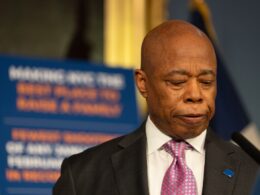Nearing the 100-day mark of his second term on Tuesday, President Trump is facing a gloomy political environment with plunging poll numbers driven by a string of unkept promises and botched policy moves, especially on the economy.
Just months after winning the popular vote and making a triumphant return to the White House, Trump’s approval ratings are badly underwater and falling, at a time in his term when he should be still basking in a popular honeymoon with voters.
He rode back to power on bombastic pledges to reduce prices at the grocery store, end foreign conflicts and deport undocumented immigrants, all on “Day One.”
Instead, Trump’s chaotic governing style and most importantly his economic missteps on tariffs have sparked a major stock market plunge and raised worries about renewed inflation and a looming recession.
A Fox News poll this week put Trump’s approval rating at just 40% with 52% disapproving, numbers that have dropped badly since January when a majority of Americans backed him. His approval rating is down 5% in the last month alone, with a string of surveys showing similar dips.
“Trump was elected to curb inflation and lower prices. He pledged to do so over and over,” said Larry Sabato, a University of Virginia political analyst. “Even some members of his base have figured out it hasn’t happened. They are starting to suspect that things will get worse before they get better.”
“The decline for Trump has no precedent, both in terms of how far and fast he has fallen, and the level where he is now mired,” said Lawrence Levy, a Hofstra University professor who studies political trends in suburbia. “Most alarming for Trump is that he is even underwater on issues that had been his strength, not just with his base, but [swing voters].”
But Trump insisted he’s enjoying total success in a Time magazine interview marking his first 100 days back in office.
“What I’m doing is exactly what I’ve campaigned on,” he said. “I have solved more problems in the world without asking for or getting credit.”

What Trump promised ‘on Day One’
On the campaign trail, Trump told voters he could quickly end the wars in Ukraine and the Middle East and bring home the hostages held in Gaza.
Candidate Trump said he would “close” the southern border and deport tens of millions of migrants.
He promised to banish “woke” ideology and diversity, equity and inclusion programs from American government and life, and to roll back transgender rights in particular.
With billionaire buddy Elon Musk by his side, he spoke of slashing trillions of dollars in federal spending, without touching popular programs like Social Security, Medicaid and Medicare.
He backed a raft of tariffs on foreign made products, which he portrayed as a godsend for the American economy and a revenue boon for the federal government.
Perhaps most importantly, Trump vowed to end inflation and even lower prices for American consumers.
“‘Over-promise and under-deliver’ is a surefire recipe for pissing off lots of voters,” said David Nir, editor of The Down Ballot. “Trump may be immune from many laws of politics, but anger over rising prices is much more potent.”
How’s it going?
The wars in Gaza and Ukraine are still raging, with all sides apparently mostly tuning out Trump’s regular ultimatums to end the fighting or else. Greenland, Canada and the Panama Canal, other targets of his wrath, have not become American turf yet.
He’s succeeded in drastically reducing border crossings by migrants at the southern border. But ousting undocumented immigrants from American cities and towns has proved much more difficult, and overall numbers of deportees are about the same as under previous presidents.
For better or worse, Trump has succeeded in making “DEI” a dirty word on college campuses and even corporate boardrooms. He’s turned the issue of trans rights on its head by ordering civil rights officials to enforce bans on transgender women in sports and other activities.
Musk’s push to cut spending has generated plenty of screaming headlines, but fallen far short of his own benchmarks for actual savings. Really slashing the budget deficit will require Congress to make tough choices like cutting very popular programs that Trump has vowed to preserve.
Jitters spread from Wall Street to your street
No issue has hurt Trump like his handling of the economy, which has most Americans from all walks of life deeply worried.
Middle- and working-class voters took Trump at his word that he would find ways to roll back the unpopular price hikes that marked the last years of former President Biden’s term.
Instead, prices have continued to rise, especially fueled by an attention-grabbing surge in the price of eggs. Inflation remains stuck above the Federal Reserve’s target of 2%, making it difficult for the central bank to juice the economy by lowering interest rates.

A disastrous trade war
Wall Street rallied behind the incoming president after his election victory last November, assuming he would reprise his first term business-friendly agenda of deep regulatory and tax cuts for the wealthy and big corporations.
In a chaotic few weeks, Trump imposed massive tariffs on imports from neighbors Canada and Mexico along with China, the U.S.’s three biggest trading partners.
He added huge and ill-defined new tariffs on the rest of the world and angrily jacked them up to an absurd 145% against China, a rate that economists say would virtually end imports from the world’s biggest manufacturer and lead to empty shelves at Walmart and Target.
Then he put a three-month hold on most of the tariffs, although he insists the taxes on cars, steel and Chinese products will go ahead as planned.
Global markets have given Trump’s erratic performance a huge, historic thumbs down. So do American voters.
“Voters are increasingly concerned about the apparent capriciousness of his decision-making,” said Basil Smikle, a Democratic strategist and Columbia University professor. “The uncertainty drives anxiety among voters and clearly in the markets.”
Stocks plunged by 20% or more, slashing Americans’ retirement accounts. Even more worrisome, the U.S. Treasury bond market also tanked as global investors spooked by Trump’s unpredictability moved their cash out of the traditional safe haven asset.
American exports are also looking at huge hits as trading partners retaliate against the U.S., especially agricultural products. Tourism is way down as angry foreign travelers boycott Trump’s America.
It all spells a likely looming recession, economists say. After mostly predicting a soft landing, analysts at many major firms now put the odds of a downturn at about 50%.
Tariff-induced inflation and rising unemployment could even combine to produce “stagflation,” a dreaded memory of the bad old days of the 1970’s.

The numbers don’t lie
Not surprisingly, Americans aren’t happy to see their 401(k) accounts in the toilet and the prospect of a price hike of close to $10,000 on that Honda at the dealership.
And a string of polls released this past week prove it.
Just 37% of Americans approve of Trump’s handling of the economy, according to a Reuters/Ipsos survey, a rating that is lower than at any point during his first four-year term, even during the depths of the COVID-19 pandemic.
A Pew Research Center survey found that just 45% of Americans have confidence in Trump’s ability to make “good decisions” about the economy, a huge drop from November when nearly 60% of respondents backed his decision-making. A huge 59% of Americans disapprove of Trump’s tariffs, the survey found.
“For Trump to be so far underwater on what once was his best issue is a worrisome sign, especially as voters continue to rate the economy as their top concern,” said Jacob Rubashkin, an analyst with Inside Elections. “He’s quickly lost whatever good will he arrived into office with.”

It could get much worse for Trump
At this time in their terms, most presidents were basking in a post-inaugural honeymoon. Even Biden, who wound up as a historically unpopular president, was riding high with an approval rating close to 60% in April 2021.
Trump, on the other hand, is already the second least-popular president in recent decades at this point in his term, trailing only his own poor numbers from his first term in 2017.
And it could get way worse.
Every president in recent history has suffered a significant decline in popularity from his 100-day mark to later in his first year in office.
A similar decline for Trump this time around would put his approval in the mid-30% level by the fall. It took Biden three years and ample evidence of his aging to get that low.
“Pretty much every president starts out with some good will from the American people, but this ‘honeymoon period’ eventually wears off,” said Nathaniel Rakich, a polling expert who worked for the FiveThirtyEight.com site.
Why his sinking popularity matters
Trump is constitutionally barred from running for another term so he likely doesn’t have to face American voters again. (He has toyed with the idea of finding a way to run for a third term, but even his strongest supporters say that’s not realistic).
But that doesn’t mean Trump won’t face consequences if he loses the support of the American electorate.
Widespread discontent with Trump could hobble Republican efforts to jam Trump’s massive package of tax and government spending cuts through a divided Congress.
“Trump has a much longer time horizon and can afford to wait out short-term economic pain. Congressional Republicans don’t have that luxury,” Rubashkin said.
And the looming midterm elections could hand the House of Representatives back to Democrats, effectively shutting the window on Trump’s opportunity to win major policy victories that he claims as his legacy.
“There’s a lot of anger and fear the administration hasn’t been able to quash,” Smikle said.

Return to the Rust Belt
Trump has long believed in the enduring power of his bond with his loyal base of white working class supporters. So it should come as no surprise that he’s holding a rally in the Rust Belt to celebrate his first 100 days, polls be damned.
Trump will address supporters Tuesday in Macomb County, Mich., an area north of Detroit that is a quintessential redoubt of culturally conservative blue-collar voters.
Michigan was one of the key battleground states Trump flipped last year from Democrats, after losing it to Biden in 2020.
The rally marks a new approach for Trump, who hasn’t made any political trips since his first week in office when he visited disaster-ravaged North Carolina and southern California, and held an event in Las Vegas to promote his plan to eliminate taxes on tips.
He’ll be hoping a cheering crowd of supporters can help him get back his MAGA mojo.








